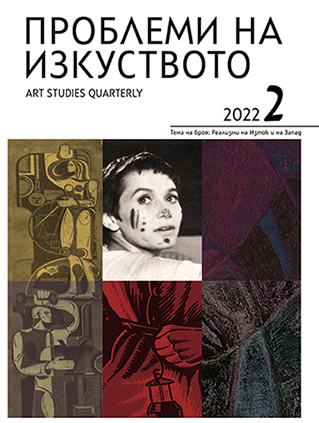In search of true realism. Eugen Blume and Erhard Monden with Joseph Beuys in the GDR
In search of true realism. Eugen Blume and Erhard Monden with Joseph Beuys in the GDR
Author(s): Mathilde ArnouxSubject(s): Fine Arts / Performing Arts, Visual Arts
Published by: Институт за изследване на изкуствата, Българска академия на науките
Keywords: Realism; Cold War; Germany
Summary/Abstract: In the divided Europe of the Cold War, realism was the subject of fierce debate in the art worlds. The interdependencies between the two rival systems were tight and permeated the views on the art theoretical challenges faced by artists. Thus, many of the discourses on art during the years of the Cold War analysed artistic practices along variously explicit political lines. They outlined the place held by works of art within the characteristic divisions of the period that reflected the system of binary oppositions distinctive of the epistemology of modernity, which were also emblematic of a conception of art as representation. However, there were also other ways to consider art in both East and West that did not follow this mimetic tradition and questioned the relations that existed between artistic practices and reality within the multiplicity by which they are linked, thereby transforming how realism is to be understood. The encounters between Eastern and Western artistic practices in Europe can make this research particularly salient, and it is to one of them that the following pages are devoted. In this debate were involved also the FRG and the GDR, the two German states that emerged from World War II, paradigmatic examples of the division of Europe, and the debates that revolved around socialist realism and the thinking they prompted in favour of a “true realism”. An exploration will made of how the pursuit of this realism by young artists and critics arose in the 1980’s from a dialogue between Marx’s thinking on art and the expanded concept of art (erweiterter Kunstbegriff) of Joseph Beuys (1921–1986). Through this dialogue, Joseph Beuys does not appear to have been an imported model by which young artists and theoreticians, belated imitators, lacking in contact with foreign countries, would have expected to be inspired. Beuys had his place in a set of reflections that stemmed from a particular knowledge of the issues at stake in the debates on realism in the socialist space and the revisions that a return to Marx allowed, reflections that were specific to these young artists and interest in which Beuys shared.
Journal: Проблеми на изкуството
- Issue Year: 2022
- Issue No: 2
- Page Range: 4-13
- Page Count: 10
- Language: English
- Content File-PDF

